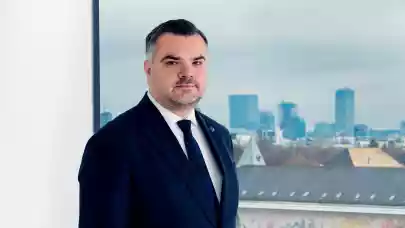
Costin Nistor, Managing Director of Fortim Trusted Advisors, spoke with Property Forum about the agency’s goal to achieve at least 20% growth in 2024 after launching new business lines and focusing on segments with development potential in the commercial and residential areas.
This interview was first published in Property Forum’s annual listing of "The 50 most influential people on Romania’s real estate market”.
How did Fortim Trusted Advisors’ business perform last year, and what are the prospects for 2024?
In 2023, we experienced significant growth, with a 32% increase in turnover. We also ventured into a new business line in the residential domain, thereby strengthening our market position and creating fresh opportunities for development. For 2024, we aim to meet our objectives by achieving an annual growth rate of at least 20%, consistent with our performance over the past three years.
Which divisions within the agency have the highest volume of activity?
Each department plays a crucial role in our company’s development and complements the overall service offering. When engaging with investors—whether they are strategic partners or potential future collaborators—we ensure that each division contributes its expertise.
Our Real Estate Management Solutions division provides the stability necessary for our company’s growth. We offer comprehensive property management services, including financial management, technical and operational oversight, project management for ongoing works, and real estate marketing and communication.
With professionalism and dedication, we take care of our clients’ properties, utilising the latest market methods based on digitization and ESG principles, ensuring the efficient and profitable management of these buildings.
Additionally, the Advisory division achieved the highest volume in 2023. Through this division, we provide consultancy services related to capital markets, office leasing, industrial and retail sectors, real estate asset valuation, and, last but not least, research.
The newest department, focused on residential properties, provides consultancy services, sales outsourcing, and sales management. We believe it holds promising prospects. The need for housing persists regardless of economic circumstances and offers long-term growth potential.

Costin Nistor
Managing Director
Fortim Trusted Advisors
What are your expectations for the commercial real estate sector, on the investment side? Which sectors have the potential to record more transactions?
The primary acquisition opportunities lie in the development land segment, particularly for data centres, premium residential complexes, hospitals, and photovoltaic projects. Also, there is ongoing interest in the retail segment, especially in retail parks that are already leased. These properties are currently more affordable and have a less sophisticated management structure. In offices, depending on the financing conditions this year, several landlords will make decisions that will impact asset prices and, consequently, their attractiveness in the market.
Furthermore, there is ongoing activity in the industrial segment. Existing developers continue to expand, either through land acquisitions or operational project purchases. Additionally, regional players seeking entry into the Romanian market prefer to acquire operational projects with development potential.
How will the office industry evolve in terms of demand in Bucharest and regional cities?
The market level could exceed last year’s in Bucharest, cumulatively moving and renewing lease contracts. We expect this because a rental cycle that started in 2019, a record year on the office market, is closing. On the other hand, very few deliveries of new office buildings are announced for the next three years, and this year, in 2024, a historical minimum will be recorded, with a total volume of up to 20,000 sqm.
As a result of the entry into the market of very few new and small-sized buildings, we expect competition in the existing office market to intensify, with well-positioned buildings that take into account ESG standards and have professional management winning. In the other major cities, Cluj-Napoca, Timișoara, Iași, and Brașov, we hope that in 2024 we will have similar or better demand than in 2023. So far, in these cities, investors have announced several large projects, but they are still looking for anchor tenants to start them, even if they have building permits. From this point of view, only Iași has certain projects, with terms of use in 2024-2025.
Is the office market still shaped by the hybrid work system? What are landlords telling you?
Companies are looking into ways to bring their employees back to the office. In the case of the buildings we manage, we do not have major changes. Even before the pandemic, some companies tested the hybrid system. During the pandemic, productivity was at its maximum, but subsequently, it began to decline. After the initial enthusiasm, now large companies are reevaluating the policy of the hybrid system and it will take another 2-3 years until we will see a certainty.
What types of companies stand out in the office rental activity that you managed last year? Do you expect changes this year?
The palette of potential tenants looking for offices this year is very large. Last year, among the new tenants we advised there were law firms, consulting firms, IT&C, and medical clinics. We even had The Home, a retailer that was looking for a corporate space for its largest showroom in an office building.
How will rents for commercial projects do this year?
Rents will generally be stable, with a slight increase in 2024, due to inflation. In 2025 and 2026, it is possible that the office rents will grow more, due to very low deliveries. On certain market segments, however, there will be office landlords who suffer from a low occupancy rate and where financing reaches maturity during this period, thus they will have to be more flexible in terms of rent terms.
What factors will shape the residential market in 2024? Could we record a decrease in the mortgage costs starting this year?
In Bucharest, 2023 was a better year than the housing market expected at the beginning. For instance, 48,597 homes were sold in Bucharest, 40% more than in 2019.
We could have a cut in interest rates starting H2 2024 if the current economic conditions do not change too much and if inflation is kept in check. Also, banks have a lot of liquidity and are interested in providing retail loans. In Bucharest, the demand has remained at a medium level even before the pandemic, especially in good areas, where among the buyers there are many cash investors, who do not need to take out bank loans.
There is still room for many new projects in Bucharest that meet the new sustainability standards and the aspirations of potential buyers.
Could we witness a rebound in CEE commercial property investments this year?
In 2022, we recorded a peak in real estate investments in Romania at more than €1.3 billion. In 2023, investments totalled less than half of this volume and 2024 has potential, but more investments will only be unlocked towards the end of the year.
However, 2025 could be much better. We have to overcome several obstacles and clarify many unknowns, among these being the conditions for refinancing current loans and the geopolitical context.



